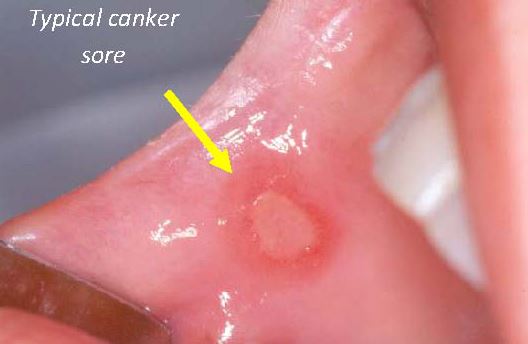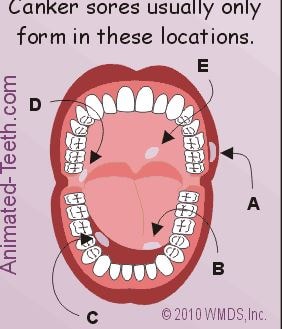What is a Canker Sore?
Canker sores are also known as aphthous ulcers. They are tiny and painful lesions that develop at the base of the gums or inside the mouth. Canker sores are commonly gray, white, or yellow in color, surrounded with a red border and it may also appear on the lips, the lining of the cheeks inside the mouth, tongue, and throat.

Although canker sores are the most common type of lesions in the mouth, women often get more of these than men. There are three types of canker sores:
- Minor canker sores that rarely appears in a year and may last only up to 10 to 14 days with no scars.
- Major canker sores that has a diameter larger than 10 mm. Unlike minor canker sores, healing may take up to weeks to months and also leave a scar.
- Herpetiform sores are big groups of other sores present at the same time as many as 100. These are small ulcers that tend to heal with no scars at all.
What causes Canker Sores?
There is no known specific cause for canker sores, but according to researcher’s suspicion, there are things that can possibly trigger canker sores which include:
- Simple canker sores can develop due to tissue injury or stress
- Ill-fitting dentures, braces, or a sharp surface of the tooth
- Minor injury of the mouth possibly from brushing, unintentional biting of the cheek or a sport accident
- Mouth rinses or toothpastes with sodium lauryl sulfate
- Hormonal shifting due to menstruation
- Food sensitivities like acidic vegetables and fruits that can either trigger or worsen the sores
- Allergic response from a bacteria in the mouth
- A diet that lacks iron, folic acid, vitamin B-12, or zinc.
Some other cases of canker sores are caused by another health condition or diseases. These may be; AIDS/HIV, Crohn’s or Celiac disease, impairment of the immune system, problems of nutrition, and Behcet’s disease.
What are the Symptoms of Canker Sores?
The following symptoms are the most common for canker sores:
- Painful sores
- Having a hard time to swallow, eat, or speak
- Crater-like ulcers that are round, gray or white with a border that is red in color
- A burning or prickling sensation before the appearance of a sore
Less common symptoms that are still considered serious include; being inactive or lifeless, fever, loss of weight, thrush infection found in the throat or mouth, and lymph nodes that are swollen. A physician or dentist is needed if the canker sores are; unusually large in size, lasts for more than three consecutive weeks, spreading, causing a terrible pain even after the intake of an over-the-counter medication, having a hard time drinking fluids to remain hydrated, and coexists with fever.
How to get Rid of Canker Sores?
For minor and common canker sores, the pain usually goes away for about a week or two without any treatments needed. If the sores are bigger in size, relentless, or painful, the dentist or a physician will require the patient to undergo medical care. Treatment options can be:
- Over-the-counter topical products that can really help the healing and ease the pain if applied to the canker sores. Ask the physician for an advice on what works best
- Mouth rinses that has the steroid dexamethasone that can also lessen the inflammation and pain
- Cautery of sores wherein a chemical substance or an instrument is being used to destroy tissue
- Nutritional supplements
- Oral treatments that are for those people who do not respond with tropical treatments with severe canker sores
Home Remedies
There are some remedies found at home to alleviate pain from canker sores and speed the healing process. Here are some tips:
- Rinsing of the mouth. Use 1/2 cup of warm water with a teaspoon of baking soda or water with the dissolved salt in it.
- Avoid or lessen foods that are acidic, erosive, or spicy that may cause more pain and irritation.
- Smear a little amount of milk magnesia on the canker sore a few times in a day.
- Brush the teeth gently with foaming-agent-free toothpaste like Sensodyne ProNamel and a soft brush as well.
- Apply ice to the canker sores by letting the ice chips leisurely melt away over the sores.
Complications
It’s pretty much difficult and irritating sometimes since the sores can affect a person’s daily lifestyle but either way, the sores have to be dealt with.
Canker sores do not usually have complications but sometimes, the person might have a feeling of run-down, oral ulceration, high fever, stomatitis, and glands that are swollen.
Sores that keeps on returning means that the patient lacks the important vitamins or there is a fundamental health problem. If the canker sores still last longer for about two weeks, a physician’s help is already needed. In most cases, the difference between canker sore complications and symptoms is still unclear.
How to prevent Canker Sores?
Even if there is still no cure found for canker sores and they repeatedly reoccur, it can be reduced by:
- Watching out what to eat by keeping away from foods like acidic vegetables, nuts, chips, spicy foods, and citrus foods that can cause mouth irritation or even foods that may trigger allergies
- Avoid constant chewing of gums
- Pick healthy foods like whole grains and a lot of fresh fruits
- Flossing and brushing the teeth regularly with a soft-bristled brush right after every meal will keep the mouth free of the foods that could possibly prompt a sore
- Protect the mouth if there are any dental appliances in it by asking the dentist with an orthodontic wax to cover up sharp edges
- Don’t be too stressed out of the sores happen to appear during those times and learn some techniques like guided imagery and meditations to minimize stress
Is Canker Sore Contagious?
There is nothing to worry about a skin to skin contact with another person having canker sores because canker sores are not contagious. Any mouth-to-mouth interaction will not spread to the other person.
Pictures




Canker Sore Vs Cold Sore
Many are confused by these two ailments since both cold sores and canker sores are small and share the same triggers and symptoms and sometimes, both occur on the same spot but it’s very important to know the distinction of both for the best proper treatment. A cold sore is contagious, unlike the canker sores. Canker sores appear inside the mouth while cold sores usually appear outside at the side of the lips or mouth. Cold sores are commonly related with the herpes simplex virus.
References:
http://www.webmd.com/oral-health/guide/canker-sores?page=2#1
http://www.mayoclinic.org/diseases-conditions/canker-sore/basics/definition/con-20021262
Canker Sores -> Overview, Symptoms, Causes and Risk Factors, Diagnosis, Treatments, Prevention at http://www.healthline.com/health/canker-sores#Overview1
Daniels TE. Diseases of the mouth and salivary glands. In: Goldman L, Schafer AI, eds.Goldman’s Cecil Medicine.
Chattopadhyay A, Shetty, KV. Recurrent Aphthous Stomatitis. Otolaryngological Clinics of North America.
Treister JM, Bruch NS (2010). Clinical oral medicine and pathology. New York: Humana Press. pp. 53–56.
